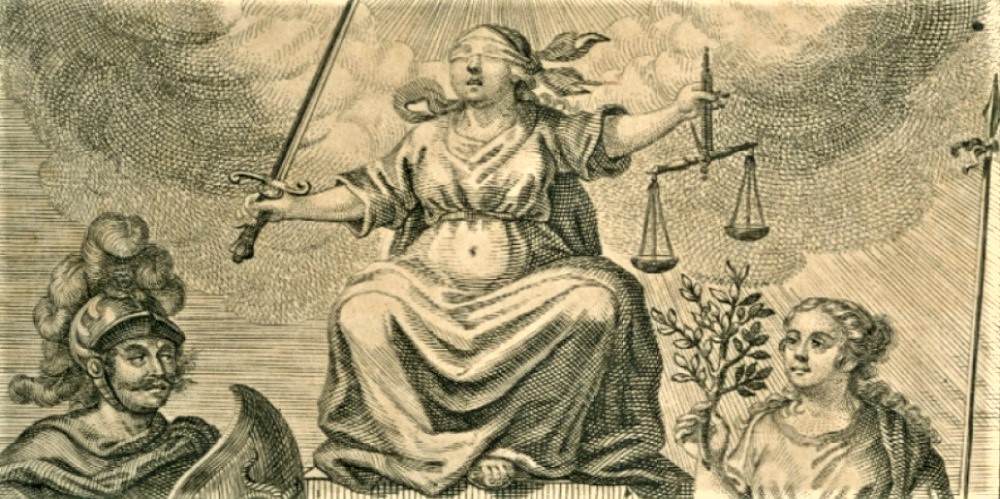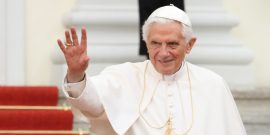Theological Roots of the Secular World Order
We are supposed to live in an increasingly secular age that has abandoned its religious roots and is now governed by non-religious moral and philosophical principles. Religious principles—frequently even religious questions—are artifacts of the past, at least among the educated movers and shakers of the intellectual and cultural world. But over the past decade or so, a number of scholars have challenged this dominant secular narrative.
For instance, Michael Allen Gillespie’s The Theological Origins of Modernity argues that modern thinkers like the Renaissance humanists, Hobbes, and Descartes sought to provide better ways to reconcile God’s omnipotence with human freedom. Their goal was the formulation of a new metaphysics, not the abolition of metaphysics altogether. Larry Siedentop’s Inventing the Individual claims that secular liberalism’s core principles were hammered out in the very Middle Ages that it is supposed to repudiate. Liberalism is the child of Christianity, not a foreign enemy. Robert Louis Wilken shows that religious liberty had its origins in Christian theology and was not the discovery of a secularism that stepped in to chastise and corral unruly believers. And Eric Nelson’s The Theology of Liberalism argues that John Rawls’s liberalism takes a clear, if unwitting, stand in the debates between Augustine and Pelagius over God’s power and human capabilities.
These scholars claim that secular liberalism is not as secular as it claims to be. Like a teenager unconsciously mimicking the parents he rebels against, our post-Christian age takes theological stances in spite of itself. With his Political Theology of International Order, William Bain provides more evidence for this line of argument. Drawing on Francis Oakley, Michael Oakeshott, and Heiko Oberman, Bain argues that today’s debates about the nature of international order have roots and take sides in the theological debates of the late Middle Ages. The secular international order did not emerge from the Peace of Westphalia like Athena from the head of Zeus. Rather, the transition from medieval to modern is a “change within inherited continuity.” Our world claims to reject God, but its political logic still operates on analogies between the divine actions of God and the political actions of man. The rise of secularism concealed these medieval theological foundations of international order but did not destroy them.
God and Order
Bain begins with a distinction between immanent order and imposed order, two mutually exclusive ways of understanding the relationship between God and the world that lie at the heart of contemporary conceptions of international order. This distinction, he says, comes from a tension between the rationally intelligible universe depicted in Greek philosophy and the absolute will of God described by the Bible. How does one reconcile the omnipotent will of God with a rationally planned universe whose order might seem to limit that will in some way?
Two theories of order attempt this reconciliation: immanent order based on philosophical realism and imposed order based on nominalism. Realism focuses on God’s intellect, which thinks the world into existence according to the rationally discernible ideas in the divine mind. Immanent order therefore posits that interrelated things come together to form a whole that imparts a rationally intelligible pattern or purpose to them. Knowledge of that pattern comes from investigating the efficient and final causes of that thing, knowing how it works and what it is for.
By contrast, nominalism focuses on God’s will as his chief attribute, not his intellect. It holds that there are no universal characteristics inhering in individual things, only those individual things themselves. God does not create according to archetypes in the divine mind that guide the activity of his will; rather, that will acts unencumbered by rational necessity. This means that the universe is entirely contingent and totally dependent on God’s will and incomprehensible power. Any patterns of order that emerge are likewise contingent and external to those things themselves. Knowledge of such patterns is acquired by observing their external causes and effects, not inquiring into their deeper purpose. Bain sees this as a matter of a return to the God of the Bible and a move away from the influence of Greek philosophy, though of course the book of Genesis is not in itself nominalist, especially if one reads it in light of the logos theology of the gospel of John.
Bain sees Thomas Hobbes not as a great proto-secularist, but as a great nominalist and Reformed Christian.
As Reformation historian Heiko Oberman observed, nominalism “determined the Geist and set the tone of the modern era.” It should not be surprising, therefore, to find that the dominant understanding of international order is a nominalist one of order imposed on otherwise chaotic states. But, Bain argues, an echo of immanent order remains, especially in moral claims based on human rights, a vague concept of humanity, or some kind of international common good. Either way, God is the presupposition grounding both immanent and imposed order. Theorists of international order have inherited a theological mode of argument and cannot abandon God and carry on. They need to replace God with something else, in this case human beings or “self-authorized values, supported by a quasi-religious faith.” But, of course, human beings are not absolutely good like the Christian God, and “humanity” turns out to be a weaker concept than an omnipotent, divine judge. “In making no room for God,” Bain concludes, contemporary theorists “remove the scaffolding that supports the original articulation and, with that, its underlying authority falls to the ground.” This, in turn, “leaves what is asserted precariously exposed to the whims of power.”
Shaping the Modern World
Having laid out the theories of immanent and imposed order, Bain explores how they shaped the thought of Martin Luther, Thomas Hobbes, and Hugo Grotius. Against Daniel Philpott and other scholars who argue that Luther’s Protestantism secularizes politics, Bain writes that Luther does not secularize the world but sacralizes it in a different way. If we pay attention to Luther’s nominalist conception of God, we can see that the separation of a secular and a sacred kingdom is derived from the status of the Christian as simul iustus et peccator, at once justified before God and a sinner enmeshed in the world. As part of his theological project, Luther cuts away the metaphysical scaffolding of Augustine and Aquinas, who see political order as gathered up and integrated into the larger order of the cosmos. This makes politics not a means of ordering the world according to God’s inherent design, but an outward discipline of order on an otherwise chaotic and sinful world.
In a similar way, Bain sees Thomas Hobbes not as a great proto-secularist, but as a great nominalist and Reformed Christian. Hobbes’s politics is a worldly application of a nominalist theological pattern. Individual human beings exist in a state of conflict. To escape this misery, human beings create a commonwealth with a civil covenant, like God speaking the world into existence. Hobbes’s sovereign who rules that commonwealth is like the God of the nominalist interpretation of Genesis: bound by no civil obligation or law. The validity of his law depends not on its coherence with a natural law embedded in the universe, but with its enactment by the sovereign. The sovereign, moreover, may be above human law, but he remains under God’s law and liable to his judgment.
Bain concludes that Hobbes’s “asocial individualism, presocial state of nature, constructed commonwealth, and irresistible sovereign can all be located within this mental universe: ontological individualism, legal voluntarism, and scientific empiricism.” Modern theorists reproduce and internalize Hobbes’s theological presuppositions when they use him to explain the character and consequences of anarchy. Hobbesian theories of international order are, therefore, neither as secular nor as modern as commonly thought: indeed, they are unwittingly staking medieval theological claims.
Hugo Grotius stands on the other side of that medieval debate. Grotius sees God as free but rational, grounding the world in a hierarchical and interconnected pattern of order that can be known by reason, and rewarding man as an incentive for obedience to his commands. For Grotius, religion is “something like the master science of human conduct; it is an eminently practical science that coordinates the ‘divine’ and the ‘human’ so that man achieves his end.” Grotius’s understanding of human sociability, for example, builds on this foundation. Man is sociable because God created him for society, and the political order governing that society should be a reflection of the order God has imprinted in the act of creation. Likewise, states can act for the sake of a common good in accord with the natural law that God has inscribed in human nature and the world, not merely for an aggregate of contingent interests.
Bain successfully demonstrates that theological ideas undergird the thought of thinkers like Hobbes and Grotius, which is his stated goal. But when Hobbes models the sovereign’s rule on God’s rule, isn’t he effectively replacing God with man, thereby creating a secular politics? Likewise, isn’t Grotius’s claim that one could make natural law arguments independent of God’s existence, which Bain does not highlight, a sign of his proto-secularism? Bain would question these interpretations. God remains in Hobbes’s equation as the judge of the sovereign, and that judgment was to be feared for someone in Hobbes’s time. Moreover, the fact that Hobbes models his sovereign analogously on God is not dramatically different from premodern thinkers: Hobbes and Aquinas both agree that a ruler should model his rule on the divine government of the world. But their different concepts of God and divine government lead to different models of human government. For Grotius, natural law without the Christian God still comes from principles written into human nature—and those principles did not write themselves. A realist theology, Christian or natural, lays the foundation for a politics of imminent order.
Theology and International Order
In our own time, Bain argues, nominalism still provides the foundation for secular thought about international order: “the oft-repeated claim that states stand to each other as individuals in the state of nature is . . . a political translation of the nominalist proposition that reality is composed of singular things.” Consistent with the nominalist outlook, these relations between states are external and not intrinsic, imposed from without and explained by investigating efficient causes and effects. The lack of a necessary pattern of right order between states at rest, and a lack of arrangement of states toward a higher goal or end of a system, reflect nominalism as well. Characteristically modern metaphors describing state action as matter in motion seem to be a turn away from religious arguments and toward secular ones. But a brief survey of Newton, Boyle, and other pioneers of mechanical philosophy show that their scientific vision coheres with and rests on a nominalist understanding of God.
Defenses and critiques of modern politics will ultimately come back to the choice between a metaphysics of inherent order or divine fiat, so which should we choose?
In the final chapters, Bain explores the unseen nominalist foundations of debates in international relations in contemporary scholars—such as Kenneth Waltz and Martin Wight—before drawing to his conclusion. We conceive of the world today in terms of imposed order, which values freedom and contingent relations. The theory of immanent order survives “largely as a rhetoric that provides relief when the abuses of unfettered freedom draws near.” There are two problems with this. First, the two are ultimately incommensurable. If there is no inherent order—no natural law, no common good—that the nations of the world must respect, then it is difficult to think of what principle could limit a sovereign state’s actions, even when they are abhorrent. One is reminded of Alasdair MacIntyre’s famous choice between Aristotle or Nietzsche: either we have a rich teleological metaphysics that gives rise to ethical principles, or a void in which the will of the strongest reigns.
Second, secular alternatives to God—common humanity and rational autonomy—have no more secure foundation than professing faith in God. Indeed, Bain concludes, we have reached a point where those concepts have less purchase, and the theological inheritance underpinning our conceptions of order has begun to unravel: “Human beings construct international order as God willed the order of the universe into existence; yet confidence in what they will is fleeting because, unlike God, they are conditionally, rather than absolutely, good. The result is an abiding condition of uncertainty that exposes the regularity of international order to the whims of arbitrary power.” Because Bain does not point to multiple specific examples, it is not clear what this means and how it cashes out in the modern world. Is our world of international relations really more uncertain and governed by arbitrary power than it used to be, either in the early modern period or in Christendom? Or do secular justifications for moral limits on power lack teeth because they lack substance? The latter seems more likely than the former.
In addition, though he does not draw this out, Bain convincingly challenges the Straussian narrative that dominates much of our discourse and sees the modern world as ruptured from and opposed to the ancient and medieval. Newtonian science, Cartesian rationalism, and Lockean empiricism are all fruits of a particular medieval Christian outlook. Bain even argues that the American founders’ focus on equal rights and the legitimacy of power coming from consent is ultimately derived from Ockham and the Council of Constance. Modern politics, like late medieval politics, are played on the field of nominalism. But Bain does not engage contemporary arguments over whether nominalism ultimately destroys healthy politics. Hobbes may be a nominalist Christian and not a contemporary secularist, but does that make his political vision sustainable and conducive to human flourishing? Defenses and critiques of modern politics will ultimately come back to the choice between a metaphysics of inherent order or divine fiat, so which should we choose?
If Bain is right that immanent and imposed order are incommensurable, can one coherently argue for the common good or human rights in a modern political society? Bain seems to think that a metaphysics of imposed order should be acknowledged, not abandoned, and that it is not harmful in itself. He likewise seems interested in strengthening concepts like human rights that provide a check on the actions of the most powerful. An argument for a nominalist politics that did this would be a welcome addition to the current debate—if it can be made.



